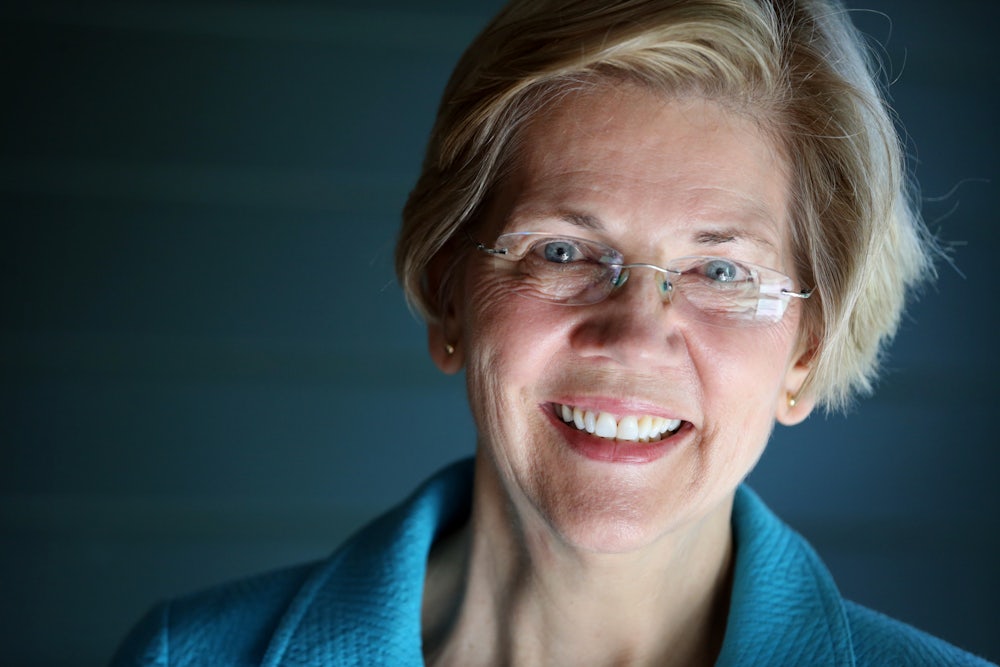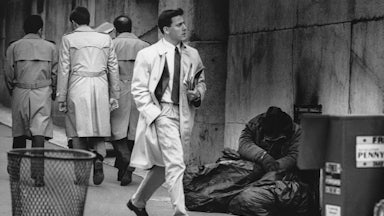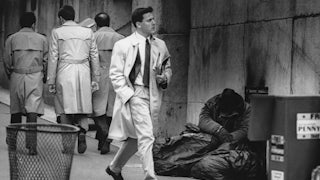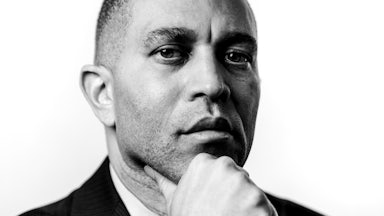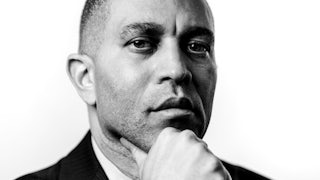Senator Elizabeth Warren is known as the plan-wielding policy wonk of the progressive movement. But underlying those plans is a simple idea: We are the government. “Government is the vehicle for letting us do together what none of us can do alone,” Warren tells hosts Michael Tomasky and Felicia Wong on episode 11 of How to Save a Country. “We all contribute, and it expands opportunity for all of us, and I feel like that’s what’s really been missing as we’ve become a post–New Deal nation.”
In this episode, Warren discusses how we can recapture that all-for-one ethos and build a stronger country: by investing in people and recognizing that democracy and freedom are inextricable. Naturally, there’s plenty of policy to discuss as well. Warren talks with Tomasky and Wong about the big wins of the last two years—from the American Rescue Plan and Inflation Reduction Act to student debt cancellation—and how they shaped the midterms. “Good policy is good politics. When you do things that people want and care about and that touch their lives, that’s both.” Later, Warren explains how her philosophy of “personnel is policy” is reflected in antitrust issues, and why abortion is a kitchen-table issue.
How to Save a Country is presented by the Roosevelt Institute, The New Republic, and PRX. Generous funding was provided by the William and Flora Hewlett Foundation and Omidyar Network. Views expressed do not necessarily reflect the opinions and beliefs of its funders.
Michael Tomasky: I’m Michael Tomasky, editor of The New Republic.
Felicia Wong: I’m Felicia Wong, president and CEO of the Roosevelt Institute.
Michael: And this is How to Save a Country, our podcast on the ideas and the people contributing to a new political vision and a new economic vision for the United States. We connect the economy, democracy, and freedom.
Felicia: Because progressives need a common purpose and a common strategy to win.
Michael: Today our guest is someone who has spent her career trying to show how the system is rigged against working families and how it could be different—and that is Senator Elizabeth Warren.
Elizabeth Warren [clip]: Government is the vehicle for letting us do together what none of us can do alone.
Felicia: I love that quote from the senator because to me, Michael, this gets to the heart of what the progressive movement stands for: acting together for the common good. This quote also counters the narrative that has had such a grip in so much of America, that government is our adversary. Government is really us. That’s what FDR said. That’s what I believe. So I love it when Senator Warren says that.
Michael: I love it when anybody says that. It just goes against 40 years of right-wing rhetoric. People have these experiences of the government as the Department of Motor Vehicles and paying taxes.
Felicia: I like paying taxes, Michael.
Michael: Yeah, I do too, actually. There’s the old Irving Berlin song, “I Paid My Income Tax Today,” which I love. But it makes it easy to caricature government, and Democrats have not always been really effective, Felicia, at defending government. They defend particular programs here and there that are popular, but they don’t just defend the abstract idea of government. Elizabeth Warren does, and she talks about things that are more positive, instances of government intervention in our lives, like student debt forgiveness.
Felicia: Which we are definitely going to ask her about. I think people see Senator Warren as the policy wonk of the progressive movement, which I think is true, but she also has this other superpower, which we’re going to talk to her about. She understands more than most people the power of what we sometimes call the administrative state, which means all the stuff besides legislation that government really does and the government really works toward. This means that the people in government who implement policy, that who you hire matters almost as much as what you hire them to do. Elizabeth Warren is the person who has put that front and center in our politics.
Michael: Personnel is policy. That’s her famous quote from back in the Obama days, and she has drilled that concept into a lot of people’s heads, including, obviously, Joe Biden, whose personnel is very different in a lot of key respects from Barack Obama’s. We will talk to her about all of that. Of course, I want to continue beating my drum on this show and in my life and ask her about freedom and what is the progressive definition of freedom and how it is related to the economy.
Felicia: And to democracy.
Michael: Exactly.
Felicia: That’s actually what I think “personnel is policy” is all about. We are making the rules and we are enacting them, and of course that’s something that the Roosevelt Institute has worked a tremendous amount on in the last few years, so let’s get into it.
Dick Robertson [clip]: I paid my income tax today. I’m only one of millions more whose income was never was taxed before. A tax I’m very glad to pay.
Felicia: Senator Elizabeth Warren, welcome to How to Save a Country.
Elizabeth Warren: I am delighted to be here. I cannot think of anything better we could be doing than saving a country.
Felicia: Yes, and talking about it on this podcast.
Michael: Let me start with a question that looks to the future, actually, that looks to 2024 specifically, and let me ask it this way. In 1944, Franklin Roosevelt unveiled an economic bill of rights. He didn’t campaign on it very strongly, but he did unveil it, at least. Now assuming for the purpose of this conversation that President Biden seeks reelection and is renominated, what would you suggest to him should be an economic bill of rights that the Democrats should advance for 2024?
Elizabeth: Oh, I love that question.
Michael: I thought you might.
Elizabeth: Yeah, because it means we get to kick back a little and just think about how we can make ourselves a country that is just a little better oriented toward opportunity for everyone. For me, Michael, it really is about this frame: What do you want as a country? What does it mean to be a country? I mean, these are like the big questions.
Michael: What’s a good society?
Elizabeth: Well, yes. For me, you build a stronger country, you build a more prosperous country, you build a more stable country, by investing in your people, and that’s how you have to think about this. I get market economies. I support market economies, got rules in place. I think they can produce a lot of wealth. But it’s ultimately about how we invest in our people. For me that means education, but it means doing things like treating childcare as infrastructure if we want mamas—and it mostly is mamas—but mamas and daddies to be able to go to work, to be able to build security for themselves, to be able to produce so that we have a more vibrant economy, to be able to go to work so that we can loosen just a little bit this tight labor market and bring down inflation. Think of all the implications of that. Then we need to invest in childcare.
Felicia: Women back in the workforce.
Elizabeth: Yes. Of the 37 richest nations in the world, the United States comes in at number 35 on what we spend on our children. You don’t build a future doing that. It makes no sense. So part of what I would really focus on is to say, “What is it together that we most want to do?” Because government is the vehicle for letting us do together what none of us can do alone. Why do we have infrastructure? Why do we, why does the government, all of us collectively, pay to pave roads? We pay to pave roads because nobody can just pave the road in front of your house. Then Felicia will do it in front of her house. You’ll do it in front of yours, Michael. I’ll do it in front of mine and we hope we have a road system that then works. Nope. We all contribute and it expands opportunity for all of us, and I feel like that’s what’s really been missing as we’ve become a post–New Deal nation. There’s been this glorification of the individual, and yeah, I love the stories of working hard and overcoming adversity, but in a context of opening those doors so people who want more education and training will have a chance to get it; so that mamas who want to go back to work will have a chance to do that; so the entrepreneur, that kid who’s 23 years old and has $42,000 worth of student-loan debt but really wants to start this business and is willing to live on ramen noodles and share an apartment with seven other people, but gets crushed by having to make a student loan debt payment every month, that we take that rock out of the way and let people do more. For me, that’s the heart of it.
Felicia: So Senator, part of it is about telling that story, which you have been doing and will continue to do, I am certain. Part of it has to do with the people who make these things happen in the government itself. A lot of your story, a lot of what you are fighting for, is a better government, a government that delivers, and a government that is, as you say, sensible. I’ve really been struck by the way in which you have commended Joe Biden, when he first came into office. You’ve said he could have hired a bunch of people who were going to serve the banks and serve well-heeled corporations, and instead he hired people who worked for the American public. Tell us why that matters to you. Tell us why personnel is policy, which you and I have both worked on.
Elizabeth: Yes, we have personnel is policy. Perfect example: The law has stayed the same for decades now on antitrust. Yet now with Lina Kahn over at the Federal Trade Commission, we finally have someone who says, “This enormous concentration, so that we go from having 100 grocery stores to 25 grocery stores to 15 grocery stores, to six grocery stores, no. It’s driving down wages and driving up prices. We are not getting the benefits of a functioning market.” She’s the kind of regulator who says, “I’m going to push back. I’m going to push back in the sugar area.”
Felicia: In sugar, in agriculture, poultry.
Elizabeth: Concentration, concentration, concentration, prices up, wages down.
Felicia: Everywhere.
Elizabeth: That’s right. Having someone at the head of the FTC, first one in decades who’s had this sort of “lean forward, I want to make markets work,” same thing over at the Department of Justice, Jonathan Kanter is her counterpart over there heading up the antitrust division—instead of saying, “Oh, I’m only going to take on fights I’m 100 percent sure I’m going to win. I’m going to ask pretty please for two giant corporations not to merge or if they merge, will they make a little promise that they won’t raise prices and otherwise just going to let these guys go off as if there are no laws in regulations, as if we had no antitrust laws”—now we’ve got somebody who’s willing to lace up the boxing gloves and get in the rain, even with some of the biggest companies in the world. I pick antitrust for a dang good reason. It’s one of those that says we need a market that truly works, and that means we need a lot of participants. Little businesses have to be given a chance to get their feet under them and to bring their ideas forward instead of just having a couple of corporate behemoths that dictate prices and dictate wages and that keep raking off the benefits of a market economy all to just a handful of insiders. That’s the kind of thing that it makes very few headlines on any given day, but it makes a big difference in the structure of how opportunity is working in the nation.
Michael: We’re going to take a quick ad break, but before we do, a reminder to our listeners, if you like the show, subscribe wherever you get your podcasts. If you’re feeling generous, give us a rating or a review.
Felicia: Yes, and follow us on Twitter. Twitter’s still there. I just checked. I am on Twitter @FeliciaWongRI.
Michael: And I’m @MTomasky.
Felicia: Be right back.
Felicia: So Senator, you have been making the rounds of late, lots of barn burner speeches, and what’s striking to me about what you have been saying about our country and our economy is that it is about government delivering. I’m going to quote you back to yourself here. “When families are hurting, when working people are hurting, government needs to deliver more and government can deliver.” Now that’s actually a striking statement because 10 years ago, that would’ve sounded almost radical, at least for many people in the mainstream political establishment, But now you say that and you get cheers. Senator, what is your thinking about this change in economics and change in the political economy over the past decade?
Elizabeth: Great question, Felicia. So I think of it this way. Good policy is good politics. When you do things that people want and care about and that touch their lives, that’s both good for them and they come back and say, “As voters do more of that. We like you. We want you to keep doing that.” I think the best example we’ve got of this is what literally has just happened. Every pundit, every pollster, everybody was saying that the Democrats were going to get wiped out in 2022, and we were going to get wiped out because historically that’s what happens. Democrats did great. The question is why, and I want to put it together this way. I think the reason why is because we showed who we were fighting for, working families, and we actually delivered for them. Two highlight examples are right at the beginning of the Biden administration. Biden was no more than declared the winner of the election before a bunch of economists were in his ear whispering, “Go slow, go small.” And Biden ignored them and he delivered the American Rescue Plan that was all about getting vaccines out and getting test kits out, but it was also about getting money out to little towns and big cities so that they didn’t have to do a bunch of layoffs. It was about extending unemployment. It was about making sure that as we entered choppy economic waters, as Covid began to recede, that families would have a way to navigate. Period number two is August 2022, just this past August. Just this past August, we passed the Inflation Reduction Act. You may remember that in the middle of the Inflation Reduction Act, we have a $35 cap on insulin for seniors, help on paying insurance premiums, a cap on what seniors are going to have to spend on prescription drugs, big, big plan to cut carbon emissions, and, my personal favorite, a 15 percent minimum corporate income tax for billionaire corporations, the Amazons of the world that have been paying nothing. Read the headlines from that time because what every headline says is that this is Biden’s finest moment in his presidency. Then Biden follows this up by canceling student loan debt for 43 million Americans, and his approval rates go even higher. So I look at that and say here are these two time periods where we delivered and people responded.
Michael: Sounds right to me. Now, you’ll probably not be able, of course, in these next two years, to do that, given who’s in control of the House of Representatives, so how do you keep making that contrast and how do you keep the unfinished business, the elements of Build Back Better, for example, before the eyes of the voters?
Elizabeth: Right. It’s a good point, Michael. Now partly, I just want to say, just a little caveat at the beginning, we also need to get out there and continue to take credit for what we’ve already put into the legislative pipeline. Because I just last night was talking to the mayor of Pittsfield, Massachusetts, and talking about there’s more money in there on climate. I want to see Pittsfield get it. They’re looking for five electric buses and they want to do solar on top of some of the public schools. So we need to also talk about what’s already there, what we brought, why we brought it, why it’s important. But the second point I’d make is that American voters are actually smart. They get that we may not be able to deliver everything that’s needed in two years, but they sure as heck want to see us fighting for them. I think that’s a big difference here and for me, student loans are the perfect example. President Biden said, “I’m going to cancel up to $20,000 of debt for 43 million Americans.” We’ve already had about 26 million Americans signed up for relief. Nobody’s gotten a dollar’s worth of relief yet, but they see a president fighting for them.
Felicia: Right.
Elizabeth: And yeah, there are these Trump-appointed judges, the courts out there saying, “No, no.” Republicans are trying to stop student-loan debt cancellation from going forward. But think about what that fight means. That’s use of power, that’s use of administrative power, not legislative power. More than anything else, there’s the difference between progressives saying, “I’m out there fighting for working people, and I’m fighting, really fighting hard as President Biden is,” or Republicans, the conservatives, right-wing extremists, who want to say, “I want to stop that, no matter what happens, I want to stop that.” I think that difference is very important to people.
Felicia: I want to take a deeper dive on student debt for a second because this again is one of those policies that used to be seen as crazy, kind of out there, the idea that you would cancel debt, but that has really moved into the mainstream obviously into policy and you have helped push that. Talk us through your thinking on student debt. When did you first encounter the idea that borrowers really need their debt canceled, and how did you push that boulder up that hill?
Elizabeth: Oh, Felicia, this one is a long, long story, but I’ll try to make it as short as possible. You know that long before I ever got into electoral politics, that I taught bankruptcy law, and one of the things I study for just pretty much all my adult life are families that go broke and why they go broke. One of the pieces of bankruptcy law that always just stuck in my craw was the fact that debts are mostly treated alike and that is that if you are under really difficult financial circumstances, you can go into bankruptcy and discharge those debts. That’s true when we’re talking about medical debts. It’s true about your car loan. You can give back the car and get rid of the excess debt. It’s true on your credit card debt. It’s true on gambling losses. It’s true even for people who were profligate and bought a baby grand piano they couldn’t afford, give back the piano and all the rest of the debt is canceled. Except student loan debt.Not only could you not discharge it in bankruptcy, the American government is one of the most aggressive debt collectors, so you were hit with late fees and made ineligible for lots of programs. We are very careful in the United States about not letting anyone garnish your social security checks because that’s supposed to be the subsistence, the bottom. Did you know that there are literally tens of thousands of people out there right now whose social security checks have been garnished to pay their student loan debts? Now, obviously during the pandemic, they also were able to take advantage of the pause, but the point is think about that. That’s the kind of government we’ve been running. The interaction of so many people with their government has been the government as debt collector.
Felicia: Right.
Elizabeth: I saw much of this during my academic work and what I reflected on is what it had been like for me. My daddy ended up as a janitor. My mom worked a minimum wage job at Sears. My three older brothers all went into the military. I wanted to be a public school teacher and to be a public school teacher, I needed a college diploma. I didn’t have to borrow money because I went to a good four-year institution for $50 a semester.
Felicia: Right, public school, state school.
Elizabeth: Exactly, state school, I could pay tuition and books on a part-time waitressing job. So I think about what happened over the space of two generations.
Felicia: You mean how the higher education system changed?
Elizabeth: Exactly, and why did that happen? By the way, that was down in Texas that I was able to get this diploma because the good people of Texas invested in their public colleges and universities to make them not quite free, but almost free. They were certainly debt-free. We’ve changed that policy completely across the board. Public colleges and universities, the taxpayers used to pick up about three-quarters of the cost of educating a student; today, they pick up about a quarter. Let’s say that the other way around: The family then has to pick up so much more of the cost of educating a young person. The federal government’s position for decades now has been, “Oh, we’ll just lend money to the student and then of course, collect on the other end.” That’s how it is that we have now a student loan debt crisis that is crushing millions of people. And I’ll put one last twist: Even if you’re not someone who owes student loan debt, even if you’re not someone who loves someone who owes student loan debt, you should care about this because the data show that young people with student loan debt are less likely to move out of mom’s basement, less likely to buy a home, less likely to start a family, less likely to start a small business. It’s holding back key parts of our economy and people’s entry into that economy. Student loan debt forgiveness: good for the families it happens to, but also good for all of us.
Felicia: It sounds to me that to move that idea from the fringes to the mainstream, you told the fairness story and you told the economic story, and now we’ve got a policy that will actually help millions and millions of Americans directly. That’s what you did to push that boulder up that hill.
Elizabeth: Yes, and we’re not through. I really want to hand out some real thanks here: Department of Education has revised not just one, but a lot of their different proposals. For example, it didn’t get headlines, but they moved in months ago and canceled the debt for people with permanent disabilities. They said, “If you’re permanently disabled and don’t have financial wherewithal to be able to pay back your student loan debt, we’re just going to wipe it off.” The Department of Education’s been doing work, and, as we speak, the Department of Justice has just put out new guidelines—let’s make a little news here—for when debt can be discharged in bankruptcy, when student loan debt can be discharged.
Felicia: That thing that drove you crazy when you were doing your academic work.
Elizabeth: That’s right.
Felicia: You’re rewriting the rules.
Elizabeth: It’s not going to change everything. There are limits on what they’re allowed to do based on what Congress has done, but they’re putting themselves on the side of the people. Instead of being debt collectors there to improve the profits of student loan servicers that are constantly lobbying them, we now have a government in the Department of Justice, in the education department, that have swung around to say, “How can we better serve students who are trying to get an education?”
Michael: I know time’s getting tight, so I can’t let you go without asking this mildly self-serving question. I think you know I had a book which came out earlier this fall, in which I say at the end, the Democrats need to tie their economic ideas to democracy and freedom, that our economic ideas are better for democracy and are going to expand freedom. Then lo and behold, the weekend before the election, I’m watching Josh Shapiro give that speech in which he said, I’m sure you saw it, “The Republicans are limiting women’s freedom, other people’s freedom, and these different ways. Our idea of freedom is invest in that girl in North Philadelphia.”
Josh Shapiro [clip]: You know what we’re for? We’re for real freedom. And let me tell you what, let me tell you what real freedom is. Real freedom is when you see that young child in North Philly and you see the potential in her, so you invest in her public school. That’s real freedom.
Michael: I assume from what I’m seeing, you shaking your fist on our screen, you think that’s a good message. Just elaborate for the listeners on why you think that works.
Elizabeth: Michael, this is so important. I’ve been talking about all the economic parts, but democracy, freedom of—abortion is actually a great example here. There were those pundits who were saying just before the election, shaking their fingers at progressives saying you talked too much about abortion. Understand this: Abortion is a kitchen-table issue. It is about freedom and medical decisions that one makes for oneself. It’s about autonomy and respect. It’s also about economic security and making decisions about one’s reproductive life. If we build an economy that has more opportunity, we strengthen our democracy. I never lose the lesson of how coming out of 2008 when so many people lost their homes, so many people lost their jobs, so many people lost their savings. The unemployment rate was artificially depressed for about seven years after that, just a tough slog for families. We struggled, we scratched to try to pull it back together, but a lot of people felt like their government had turned their back on them, had bailed out giant financial institutions, but had not been there to help them. They felt that way and in many ways they were right. I never forget that the next president elected was Donald Trump, that if we build an economy where more people can participate, we expand freedom. If we protect freedom, we build a stronger economy and democracy. These pieces are all related to each other. Shame on us if we don’t make those connections every day. But here’s the thing, I think the American people do make the connections, I think it’s the politicians who are behind, and big applause for you, Michael, for your book and for drawing this out and to everyone who has started to connect those dots, if for no other reason than to encourage our elected officials to talk about these issues and to talk about them in that context.
Paul Wellstone used to say, “We all do better when we all do better.” There’s a lot of layers to that statement, but I’ve always taken part of it as when more people have more opportunities, it makes us a democracy that values each other and values both our differences and our similarities, and that that is how we build the best possible future as a nation.
Felicia: Senator Warren, I just have to ask you our signature question for this show, for this podcast, how would you save our country?
Elizabeth: I’d invest more in our people. I’d treat everyone with respect. And I’d be willing to get in the fight because I think our people, I think our freedoms, I think our democracy are worth fighting for.
Michael: Senator Elizabeth Warren, we really appreciate your time. Thanks for joining us.
Elizabeth: Thank you for having me. This is a great podcast. I like you guys.
Felicia: Thank you, senator.
Michael: Spread the word.
Felicia: That was a great conversation, Michael, and it was also an inspiring conversation.
Michael: Yeah, it’s inspiring, and I always find her very informative because she marshals a lot of facts and she gives you a lot of information, and she’s not just blowing rhetorical smoke at you the way some politicians do. She makes an argument and she uses statistics, but then she connects those statistics to a larger narrative in what I find to be a very compelling way.
Felicia: She made so many great points about student debt and what had been the story about the power of government to help its citizens become educated through free or public higher ed became, over the course of many decades, a story about government becoming a really aggressive student debt collector, one of the most aggressive debt collectors in the country.
When the democracy that you’re a part of has become so deeply intertwined with your debt, that can really corrode, and I think it has corroded for a lot of young people, the relationship between them and their government, and then a feeling of disillusionment will set in, and so that’s why we progressives have to change that. That’s why debt forgiveness, that’s one of the many reasons that debt forgiveness was so important.
Michael: That’s at the heart of her politics in general. I read in her book that she started out with conservative assumptions when she started teaching herself about bankruptcy law, thinking that a lot of people were taking advantage of bankruptcy laws. Then she got into it and dug into the weeds of it and saw that the reality was just the opposite, that people needed these bankruptcy protections very clearly, and that in a lot of cases they didn’t go far enough and didn’t give people enough protections and that’s what helped her think of the Consumer Financial Protection Bureau. It all has to do with government being a vehicle for collective action.
Felicia: Yes, us doing together what we can’t do alone. Then that ties back to this idea, this progressive idea of freedom, public institutions, like public schools, that give us the opportunity to fulfill our potential, that is freedom.
Michael: Yeah, and that’s why I said that thing about her shaking her fist. We recorded this episode in a slightly unusual circumstance. Felicia and I were together in a studio in Washington, sitting next to each other. We were watching Senator Warren on the screen. And so when I mentioned that stuff about Josh Shapiro and his freedom speech, she started shaking her fist—in a good way, not at me like she was angry at me, but in a good and excited way, pumping her fist, let’s say, because she gets that. She gets that there is a progressive liberal definition of freedom and that’s at the heart of it. It ties back to, Felicia, what Heather Cox Richardson said to us in one of our very first episodes. The right-wing definition of freedom is “freedom from,” leave me alone. The liberal definition is “freedom to,” giving people the tools to better themselves.
Felicia: I also think the progressive or liberal version of freedom is freedom outside of the market and that is really what I want us to think about: What government can do if we have that kind of freedom? I think it’s a good thing to ask our listeners because until next time, I’d love our listeners to think about: Folks, what do you want the government to do? What big things should government do, because we have to do them together? I think that’s a great thing for people to talk to their families about over the holiday.
Michael: It is, and I have a few ideas along those lines.
Felicia: I’m sure you do, Michael.
How to Save a Country is a production of PRX in partnership with the Roosevelt Institute and The New Republic.
Michael: Our coordinating producer is Kara Shillenn. Our lead producer is Alli Rodgers. Our executive producer is Jocelyn Gonzalez. Our mix engineer is Pedro Rafael Rosado.
Felicia: Our theme music is courtesy of Codey Randall and Epidemic Sound. Other music is provided by APM. How to Save a Country is made possible with support from Omidyar Network, a social change venture that’s reimagining how capitalism should work. Learn more about their efforts to recenter our economy around individuals, community, and societal well-being at omidayar.com.
Michael: Support also comes from the Hewlett Foundation’s Economy and Society Initiative, working to foster the development of a new common sense about how the economy works and the aims it should serve. Learn more at hewlett.org.
